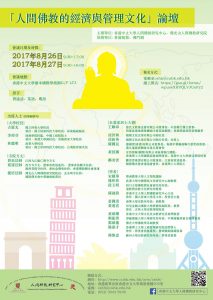2018 Buddhism & Business Conference: Business Management & Innovation under Humanistic Buddhism
Co-organizer
Centre for the Study of Humanistic Buddhism, The Chinese University of Hong Kong
Fo Guang Shan Institute of Humanistic Buddhism
Background
Traditionism, Modernism, Post-modernism… the world has become a confluence, at which these ideologies are crashing and mingling. Such cross-cultural era sees the emergence of “Buddhist-businessmen”, marking the raise of traditional Chinese culture and Chinese entrepreneur. Buddhist-businessmen, with their enlightened mind and spirit, apply Buddha’s teachings and thoughts into their business, bring benefits to the society and the public. Buddhist-businessmen search for Buddhist wisdom, and have a set of righteous moral codes when conducting business. They are committed to charity, thoughtful to clients, and benevolent to their staffs. Buddhist-businessmen and their business models are the new wave both in Chinese circle and the world.
Under the umbrella of professionalism, business management is about understanding and inspiring others, and making sound judgements under complicated situations. Humanistic approach is the foundation of a business, this resonates with the recent flourish of Chinese values in management. Management will fall under Capitalism, if its goal is solely about making profits – this no longer fits into the current emerging trend of Humanistic management.
Master Hsing-Yun says, “Management is a test on compassion and wisdom. More important, people and their benefits matter. Address to others’ hearts as if addressing yours, be sincere and humble. This is what a satisfactory management should be.” The Master’s words tell us about Buddhist thoughts on mutual benefits. From an humanistic point of view, workers should not be treated as a tool of production; the management should let them achieve their best and satisfaction for life.
The model of Buddhist-businessmen sees a synthesis of Humanistic management and business success. In this contemporary world, how Buddha’s wisdom shines in business and operation routine? How Buddhism compatibly and sustainably mingles with economic and social development? These all matter to both the academic and corporate.
Jointly presented by Centre for the Study of Humanistic Buddhism, The Chinese University of Hong Kong, and Fo Guang Shan Institute of Humanistic Buddhism, “2018 Buddhism & Business Conference” will be held on 15-16 December 2018, in the headquarter of Fo Guang Shan, Taiwan. Scholars of Buddhism, scholars of business, and representatives of corporate are cordially invited. Topics such as Buddhism and business, monastery economy will be covered. The conference aims to serve as an exchange platform for Buddhist scholars and corporate entrepreneurs, to explore the wisdom and compassion of Buddha’s teaching, in order to cultivate one’s heart, for now and the future. The conference also aims to promote Buddhist-businessmen’s engagement in politics, society and culture.
Theme
Business Management & Innovation under Humanistic Buddhism
Topic (1)
- Master Hsing-Yun on Management
- The corporate culture of Fo Guang Shan
- Remodeling the monastery management
- Redefining the commercialization of monastery
Topic (2)
- The ethic of Buddhist-businessmen
- The wisdom and innovation of Buddhist-businessmen
- Buddhist theory and corporate management
- Buddhist ethic and corporate remodeling
- Buddhist spirit and the responsibility of social enterprise
- Buddhist thoughts and innovation in management
Conference Details
Date
Registration: 14 December 2018 (Whole day)
Date: 15 – 16 December 2018 (Sat & Sun)
Time
15 December 2018: 8:30 – 17:00
16 December 2018: 8:30 – 16:00
Venue
Fo Guang Shan, No.153, Xingtian Rd., Dashu Dist., Kaohsiung City, Taiwan
Post-conference Activity
Visit: 16 December 2018 (venue to be confirmed)
Closure: 16 / 17 December 2018 (no visit)
18 December 2018 (after visit)
Acknowledgment of Receipt
Please submit before 30 September 2018
Reception and Accommodation
Economy air tickets to Taiwan for international scholars. Railway and accommodations will be provided for scholars travelling from Taiwan
Speech and Paper
Please submit your complete speech or paper before 15 November 2018 for the consideration of the conference committee. A conference journal will be published
Receipt
PDF
Related News
2018佛‧商對話 談人間佛教的管理與創新
“Economy and Management Culture of Human Buddhism” Forum
Organizer
Centre for the Study of Humanistic Buddhism, The Chinese University of Hong Kong
Fo Guang Shan Institute of Humanistic Buddhism
Co-organizer
The Mirror Post, Buddhist Door
Origin
When the time Buddhism was becoming established, India was in the first urbanization period. Merchants gradually flourished. At that time, the Buddha aimed at the traditional Brahmin’s monopoly on the ethics of offering sacrifices to the gods, and advocated the life ethics of “equality, autonomy” and “self-reliance”, which made the emerging social class a broad audience. These emerging classes are mainly engaged in a variety of commercial activities. According to the Sajyuktāgama Sūtra: “the businessmen of livelihoods, farm merchants, cattle and sheep grazing, and housing for profit.” As long as they can profit from their capital, they are diligent and earn money. Whether it is agricultural and animal husbandry harvests, or business and trade, business operations, investment income, etc., they are all economic activities recognized by Buddhism.
Buddhists who engage in business activities must emphasize the principle of “a gentleman loves money and obtains the right way.” According to the teachings of Buddhism, this “doctrine (dao)” should conform to right view, right thought, right speech, right action, right livelihood, right effort, right mindfulness and right concentration (āryāṣṭāṅgo-mārgo). The “Eight Enlightenment Paths (Skt.: āryāstāvgika-mārga)” can turn Buddhist “doctrine (dao)” into a commercial “doctrine (dao)”, allowing Buddhist merchants to follow when they are engaged in business transactions. Any enterprise must pay attention to profit and maximize efficiency. Therefore, in the pursuit of profit, Buddhists must have Buddhism beyond utilitarianism as the basis to follow, convert the profits obtained into social welfare, and achieve the maximum of the enterprise. Buddhism, which has a history of more than two thousand years, provides abundant resources for the business world. Moreover, Buddhism has organized, systematic, and procedural education, culture, charity, and spiritual practice, which not only continues the Buddha’s wisdom and mission, but also promotes social harmony and progress. Thus, the entrepreneurial spirit of Buddhism, as well as the essence of education and culture, are indeed a great treasure of mankind.
With the continuous progress and diffusion of corporate civilization and commercial culture, Buddhism is also facing a new situation of survival and propagation. Is traditional reciprocal generosity sustainable? What impact is the modern business model having on the operation of the Buddhist Sangha? These are the issues that “Humanistic Buddhism” must confront. Centre for the Study of Humanistic Buddhism, The Chinese University of Hong Kong, Fo Guang Shan Institute of Humanistic Buddhism, The Mirror Post and Buddhist Door, sincerely invite the eminent monks who manage the monastery, the foreign academic elites, and the Buddhist celebrities of the business community to gather together in a round table forum for the development of “Economic and Cultural Management of Human Buddhism”. In order to explore the relationship between the development of Buddhism and business activities, how Buddhism can benefit business activities, how Buddhism can help people in business, how Sangha community benefit from business management experience, and so on.
Theme
The Economic and Management Culture of Humanistic Buddhism
Topic
- The Management Culture of the Temple Economy
- Buddhist Ethics and Business Management
- The Inspiration of Buddhism on Business Management
- Dharma’s Inspiration for University Management
- Buddhism and Taoism and Corporate Social Responsibility
Conference Details
Date
26 – 27 August 2017 (Sat & Sun)
Time
26 August 2017: 9:30~17:00
27 August 2017: 9:30~16:00
Venue
The Chinese University of Hong Kong
Registration and Departure
Registration: 25 August 2017
Visit: 28 August 2017 (Visit to Hong Kong monasteries and historical sites)
Departure: 29 August 2017
Paper abstract or talk topic
- Scholars please submit abstracts before 15 June 2017
- University presidents, monastery abbots, and corporate patriarchs, please submit your conversation topics before 15 June 2017
Speech or Paper
- Scholars are kindly requested to give a complete paper before 1 August 2017, for the forum organizing committee to prepare relevant seminar materials and compile the collection of papers.
- University presidents, monastery abbots, and corporate householders do not need to submit papers. They only need to provide a brief talk before 1 August 2017 for inclusion in the collection of papers.
Programme
PDF
Related News
「人間佛教的經濟與管理文化」論壇 香港中大演繹 (人間通訊社) Website / PDF
佛家經濟管理智慧:管人也管心 (香港鏡報) PDF
僧學商三攜的佛教管理思路與實踐——記一個劈劃人間佛教新徑的研討會 (佛門網) Website / PDF
將佛陀智慧與商道結合 港中大論壇探討佛商結合之道 (香港商報) Website / PDF
“人間佛教的經濟與管理文化”論壇在香港舉辦 (菩薩在綫) Website / PDF
“人間佛教的經濟與管理文化”論壇在香港舉辦 (佛教在綫) Website / PDF



